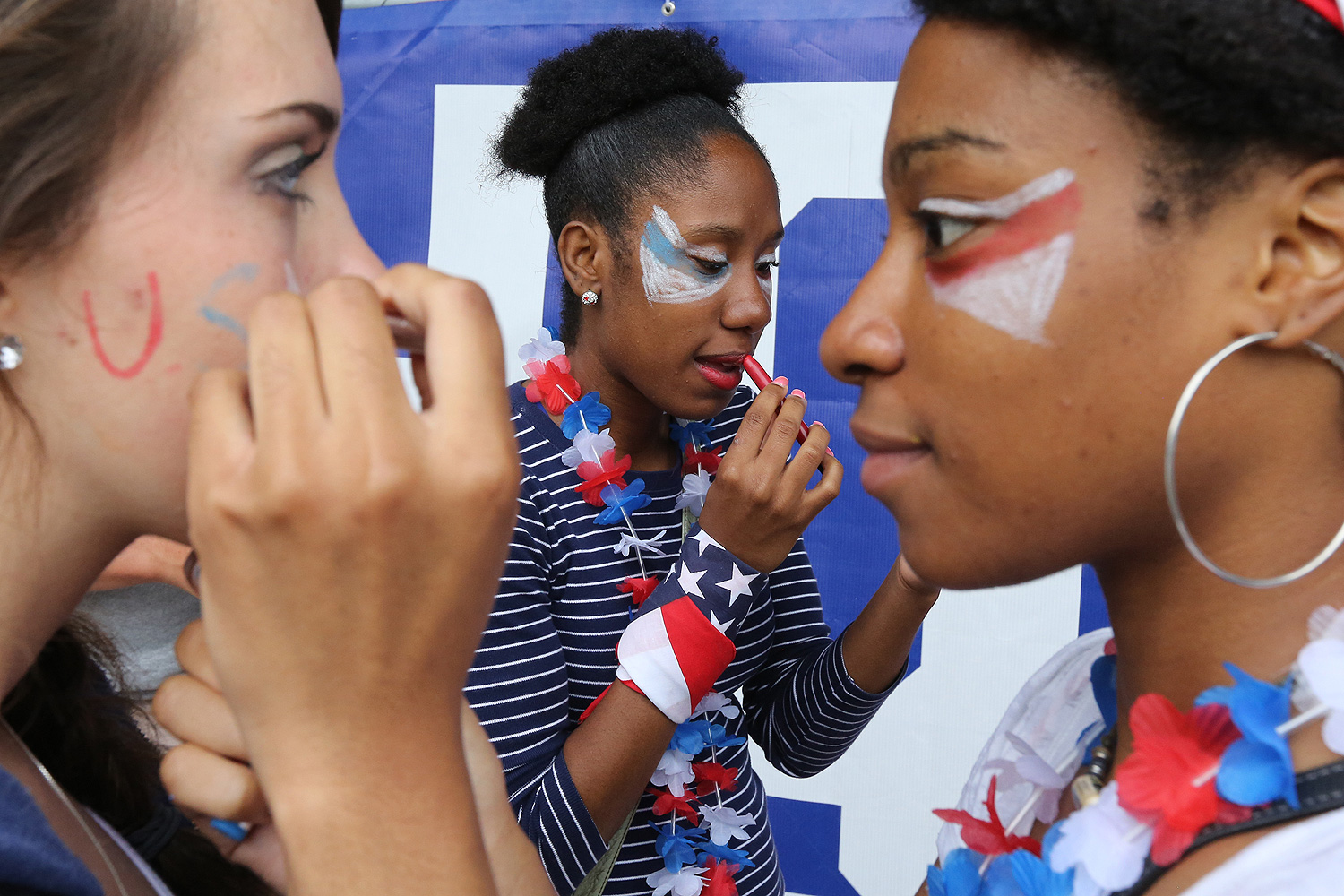My favorite article of clothing as a kid came crammed into a cereal box, formed from Tyvek, the choice miracle fabric of asbestos-remediation workers and Devo. It bore spectacularly 1990s photo-realistic action portraits of the U.S. men's national basketball team, the Dream Team of 1992, assembled to reassert America's dominance in what was, at the time, arguably the country's favorite sport.
Certainly, it was mine. I watched every game; the U.S. beat every team by at least 30 points, a show of force as impressive, oppressive, and suspensful as a carpet bombing. Ironically, or not, the team would undermine America's basketball hegemony, igniting interest in the sport worldwide and leading to an NBA dominated by a team built around an American, a Frenchman, and an Argentinian.
It was a good time to be an American kid. We'd watched the fall of the Berlin Wall and the end of communist Russia on cable television. Coming out of a recession—in retrospect, a minor one—the country's median income was about to climb to historic highs. And forget the Olympics; the Thomas Friedman of his day claimed we'd actually won history, ultimately the point of the whole American project.
Kids from those days started college around 1998. When we finished, everything had gone to hell, save for a moment of panicky pseudo-prosperity that would set the subsequent generation farther still, all the way back home to the approbriation of the elders who'd, frankly, bollixed it all.
A generation later, America seems to be excited about a national sports team in a way that it hasn't since the Dream Team. Grant Park, Chicago's front yard, didn't suffice for the audience in America's most soccer-drunk city, so it's opening up Soldier Field, on a weekday afternoon, so that people can gather to watch soccer on television
It doesn't exactly make sense. The U.S. Men's National Team isn't a Dream Team; it might not be much better than the 2002 World Cup team, and it hasn't played that much better than expected. There are mitigating circumstances, like start times at waking hours and much greater access to the global game, but still: it's a Tuesday afternoon, and tens of thousands of people are expected in Soldier Field. And they're not there to watch Eden Hazard (though I'm sure some Chelsea fans will enjoy it).
We've had soccer fads before, but something about the time feels right for this. College athletics are on the brink of revolution. America's actual pasttime, professional football, is facing a morass of bleak lawsuits, prominently featuring members of the most beloved team in Chicago sports history.
Aside from the instinctual Boomer hostility, America seems prepared to embrace a sport we didn't invent, aren't especially good at, and are conceptually uncomfortable with. As Brian Phillips put it, "we wound up celebrating after losing to Germany, which is exactly the kind of non-regulation historical shenanigans that make the Greatest Generation think soccer is for ballerinas and communists."
I've also heard grousing, from the other hand, from international fans who worry that dim converts will approach the beautiful game with all the dignity of Clark Griswold in a roundabout. Or, worse, like McGeorge Bundy in the Oval Office.
Trend: American journalists identifying how football is unfair or imprecise, and suggesting fixes. But—thanks!—we don't want it fixed.
— Teju Cole (@tejucole) June 24, 2014
"Few native speakers of this game would wish to lose the organic narrative that emerges out of its randomness, the way a good novel might gather seemingly unrelated facts and incidents into an emotional peak," Cole writes. "If football’s 'flaws' were as intolerable as American writers would have us believe, it would neither be the world’s biggest sport nor one of its biggest forms of cultural expression."
Perhaps the world shouldn't worry. We're chastened, for now at least, in foreign policy, and increasingly looking elsewhere for inspiration in domestic policy, to virtually the rest of the developed world for inspiration and investment in education, health care, energy, and transportation systems that no longer compare favorably to our peers. More than at any point I remember in the past couple decades, America is less interested in outpacing other countries or exporting our fixes, and more interested in borrowing from them to address our flaws. The Greatest Generation helped rebuild Germany's industrial base; now we're importing their models, to the center of Chicago, to rebuild our own.
Any occasion that situates the US as just one among many nations, and not necessarily the most gifted or interesting, is a wonderful thing.
— Teju Cole (@tejucole) June 26, 2014
Likewise, the architect of America's Team is a recent German immigrant who's active in recruting and importing American citizens from the Continent's superior development programs. (A MLS team graduated its first developmental player to the World Cup just this year, DeAndre Yedlin.) It's our time—not to win, necessarily… ok, with essential certainty—but for something much more.



